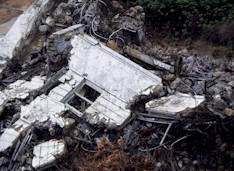The Bush Pathology



| SYNOPSIS: Bush's failures in the Gulf Coast as well as in the Middle East are the natural consequences of his attitude toward government. If we want to avoid more such debacles, we need to forthrightly confront the attitude. |
The public got a good look at George W. Bush’s actual values in the aftermath of Hurricane Katrina, when it became apparent that rather than put a competent emergency management professional in charge of the Federal Emergency Management Agency (FEMA), he had chosen instead to install someone whose only demonstrated skill was at raising campaign funds for him.
That revelation came on top of the increasingly hard-to-ignore failure of Bush’s military adventure in Iraq. Many people (myself included) might have forgiven him for manufacturing a questionable case for going in, if the net result had been something positive--or even demonstrably competent. What we have gotten, though, is something entirely different.
Bush has plunged Iraq into a depressingly intractable form of chaos, handing al Qaeda and the radical Islamic fundamentalists a far more attractive recruiting opportunity than they could ever have dreamed up on their own
In the process, he has taken the most impressive fighting force in world history, and effectively broken it.
The Iraqi campaign has demonstrated to every second-rate country in the world that it is not necessary for their troops to meet us on the battlefield. All they need to do is assemble a motley collection of people to set off roadside bombs. Our once invincible-looking soldiers can be easily maimed or killed, and we will eventually slink off with our tail between our legs.
Bush has also changed the basic premises of U.S. military service, creating such extended disruption and hardship for soldiers and their families that skilled personnel are leaving the military in droves, with recruiters despairing of their ability to fill the gaps.
Perhaps in the not too distant future, the general public will also begin to grasp how profoundly Bush skewed the process of gathering and evaluating intelligence in the buildup to the invasion. As has been amply documented (click the asterisk on the black navigation bar below for more), but as yet under-remarked, Bush inserted his own political operatives throughout the process, ensuring that material which could be used to justify invading Iraq was passed on up the chain, even when it was severely questioned or dismissed as unreliable by the professional intelligence community.
It may also not be too long before the general public understands how many times, and in how many ways, Bush dismissed warnings about the dangers of civil chaos in the aftermath of Saddam Hussein’s fall--the kind of looting and general lawlessness that actually came to pass within hours of Saddam’s defeat, and which in short order bred the insurgency that now bedevils us. Bush brushed aside the recommendations of virtually every U.S. government-organized study group created to address post-Saddam transitional issues, as well as the more pragmatic advice of certain senior military officers, who were simply trying to ensure that we attacked with a big enough force to ensure minimal civil order (Again, click the asterisk below for further details.)
In the end, what Bush has demonstrated about himself in Iraq has been incompetence on an epic scale.
It is similar to what we have seen of FEMA in Hurricane Katrina--and for similar reasons.
Ultimately, both fiascoes are the result of Bush’s approach to government.



